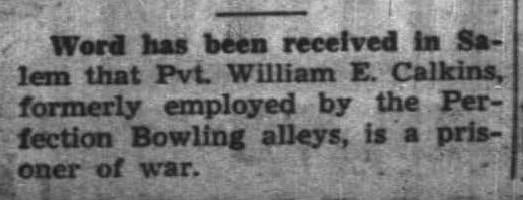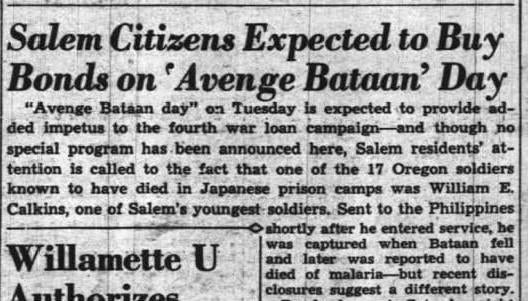The remains of a missing World War II soldier from Oregon have been identified and are set to return to the state for burial, federal authorities announced Thursday.
The remains of U.S. Army Private William Calkins, 20, were identified after being exhumed along with other unknown soldiers buried at the Manila American Cemetery in the Philippines, the Department of Defense said.
The department’s Defense POW/MIA Accounting Agency, tasked with recovering prisoners of war and service members missing in action, said Calkins was captured after U.S. troops in Bataan province surrendered to Japanese forces. After surviving the harrowing 65-mile Bataan Death March, he was held at Cabanatuan POW Camp #1, where records show he died on Nov. 1, 1942, at the age of 20.
In a news release, the agency included multiple Oregon newspaper clippings from the war, including one that reads: “Word has been received in Salem that Pvt. William E. Calkins, formerly employed by the Perfection Bowling alleys, is a prisoner of war.”
DPAA
Calkins was buried with other prisoners in what was known as Common Grave 704.
After the war, his remains were exhumed from the camp and relocated to the Philippine capital, where they were buried as “unknowns” at the Manila American Cemetery and Memorial, the agency said. They remained unidentified until this year.
In 2018, in an effort to identify the unknown remains associated with Common Grave 704, the agency exhumed them once again and sent them to a laboratory. There, scientists used DNA analysis and other techniques to identify Calkins’ remains.
A rosette will be placed next to his name on the Walls of the Missing at the Manila American Cemetery to indicate he has been accounted for, the agency said.
Calkins’ remains are set to return to Oregon for burial in the Portland suburb of Hillsboro in September.
According to the DPAA, prisoners at Cabanatuan POW Camp #1 endured horrific conditions and death rates soared due to lack of medicine and food.
“Because so many men were dying, burial parties worked every day. Each morning, the men would gather at the morgue and organize into teams to begin the march to the cemetery. The camp adopted a mass internment system, burying all that died in one day in one common grave,” the agency said. “The burial party would deliver the dead to the cemetery and then dig the mass grave for the next day.”
DPAA

